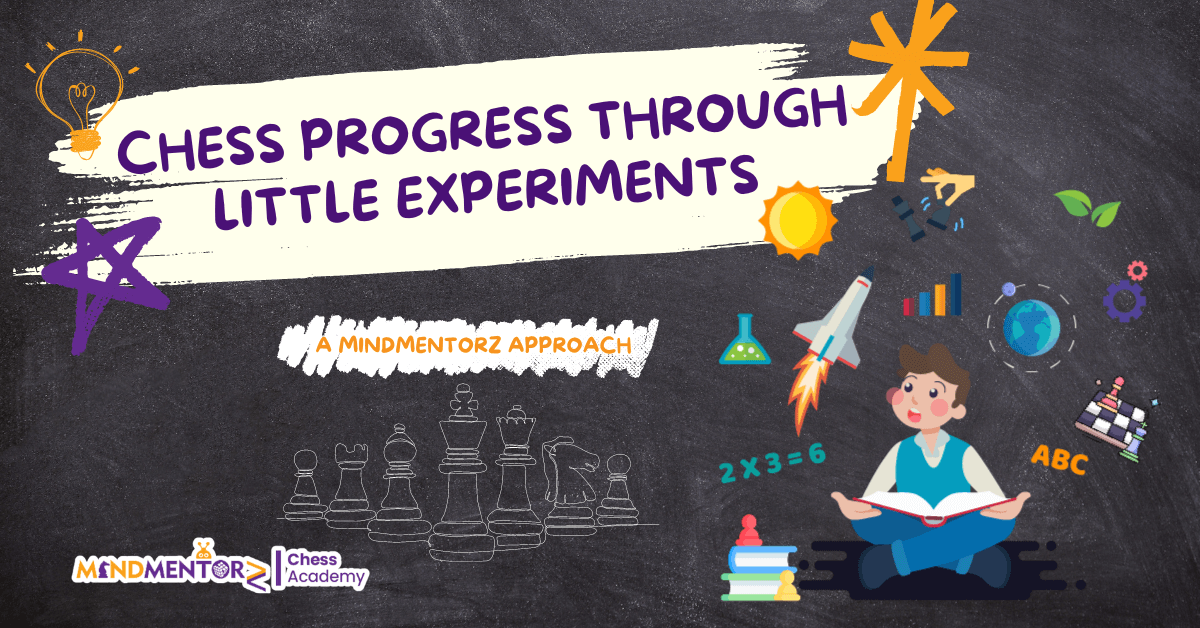
When it comes to learning chess, the journey can feel overwhelming, especially for beginners and intermediate players. At MindMentorz Chess Academy, we believe that progress doesn’t come from just big, decisive moves, but from a series of smaller, practical steps—what we call “little experiments.” This mindset helps reduce the pressure on students to make “perfect” decisions and instead encourages a learning environment based on trial, error, and steady improvement.
The Importance of Experiments in Chess
Have you ever felt uncertain about choosing an opening, or perhaps overwhelmed by all the chess strategies you think you need to master? It’s a common feeling. Many chess students think they need to get everything right the first time, which can lead to frustration and burnout. In reality, chess is a game of learning from your moves, refining strategies, and most importantly, experimenting.
For example, when learning new openings, we encourage our students to experiment with different strategies. The first step is to recognize that every opening you try is an experiment—it’s reversible, and the goal is to learn something, even if the experiment fails. This approach removes the fear of “getting it wrong” and replaces it with curiosity and a growth mindset.
Case Study: Opening Experiments
Let’s consider the dilemma of picking the perfect opening, a scenario many of our students face. Instead of stressing over which opening will guarantee the best results, we guide them to take it as an experiment. We set a time frame, say three months, and suggest focusing on learning new plans and ideas through the opening rather than perfecting every move. This way, our students not only gain practical experience but also reduce the time wasted on theory that may not suit their style of play.
Practical Examples at MindMentorz
In our academy, we follow this philosophy in various ways. Whether it’s trying out different training methods or approaching tournaments with a flexible mindset, we encourage small experiments. Here are a few examples:
Flexible Practice Sessions: Instead of rigid schedules, we let students experiment with their study routines. Some may practice tactics for an hour each day, while others may prefer 30 minutes of opening drills followed by endgame practice. The goal is to see what works best for each individual.
Tactical Puzzles: Solving tactical puzzles can sometimes feel repetitive or too challenging. That’s why we encourage students to experiment with different difficulty levels or solve them in different environments (for example, with a clock running or without one). This variety keeps the learning fresh and effective.
Game Analysis: One of the best ways to improve is by analyzing your own games. However, many players feel discouraged when they don’t see immediate improvement. We encourage students to look at each analysis session as a learning experiment, focusing not just on mistakes, but on the “why” behind them. Did you miscalculate? Did you get too ambitious? Each analysis is an opportunity to refine decision-making.
Why this Approach Works
The experimental approach aligns perfectly with how chess works in real life. Each game you play is a mini-laboratory where you test hypotheses about strategies, positions, and decisions. Our students at MindMentorz have seen great progress because they don’t fear making mistakes—they see them as data points in their journey to improvement.
Furthermore, this technique helps reduce the overwhelm. Too often, chess learners buy too many books or subscribe to multiple courses, yet don’t finish any of them. We recommend choosing one resource and sticking with it, considering it as an experiment. Finish the resource, evaluate its impact, and then decide if it’s time to move on. This approach helps students avoid the fear of missing out (FOMO) and the paralysis of having too many options.
How Little Experiments Can Benefit All Players
The experiment-based approach is not just for beginners. Even advanced players can benefit from the idea of reversible decisions. Whether it’s testing out a new opening repertoire, trying new time controls, or adjusting your mental approach to the game, chess improvement is rarely linear. At MindMentorz, we tell our players, “It’s okay if your experiment doesn’t go as planned. What matters is what you learn from it.”
Encouraging a Growth Mindset
When students start seeing chess improvement as a series of little experiments, they naturally develop a growth mindset. They stop looking for quick wins or shortcuts and instead focus on long-term progress. This aligns with the MindMentorz Chess Academy’s core philosophy: improvement is about consistency, curiosity, and learning through experience.
Final Thoughts: Start Your Chess Experiments Today
So, if you’re feeling stuck or overwhelmed in your chess journey, take a page from our book. Start small. Try a new opening for a few weeks, adjust your study habits, or approach tournaments with a fresh perspective. At MindMentorz Chess Academy, we’re here to guide you through these little experiments, ensuring that every step you take moves you closer to mastery.
Chess isn’t about making perfect moves all the time; it’s about experimenting, learning, and continuously growing. By adopting this mindset, you can transform your game and enjoy the process of becoming a better chess player.
